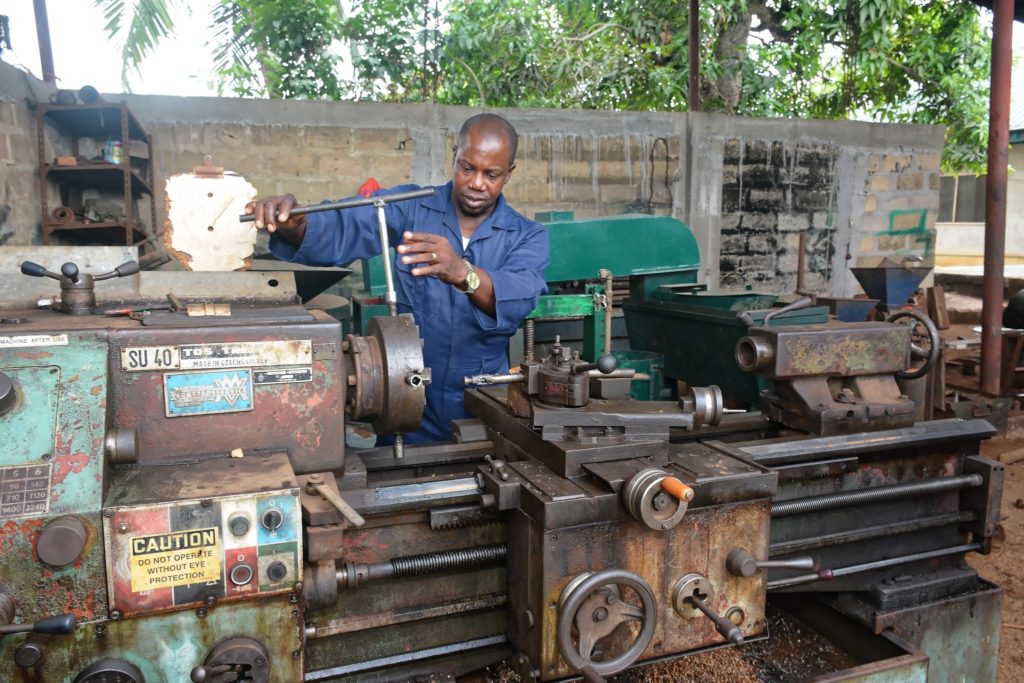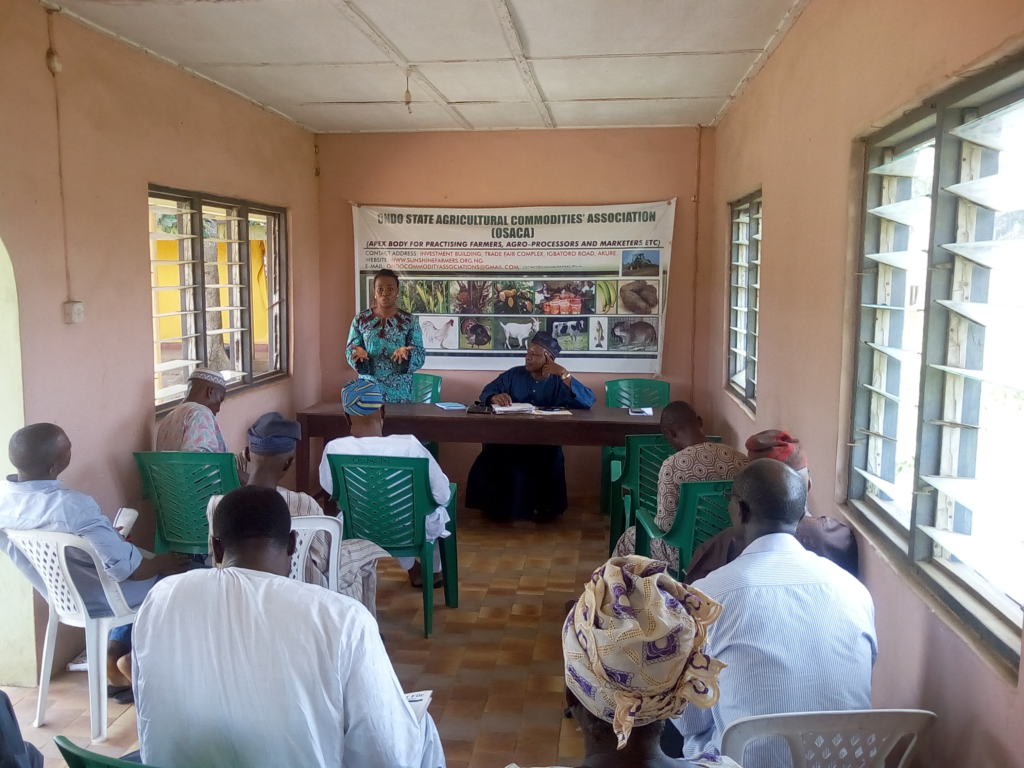2016 saw the continuation of our work to improve farmers’ access to improved technologies, but we added something new: trainings to enhance these farmers’ practices. Our Best Management Practices (BMPs) to improve agronomic practices in the farming of oil palm started late in 2015 with a research trip to Ghana.
“We did our research and saw how well these best management practices worked for Ghanaian farmers where Solidaridad’s improved oil palm cultivation techniques were first tried,” said Blessing Allen-Adebayo, our palm oil value chain Market Development Officer, referring to the Dutch-based international development organization with an extensive program in Ghana. “I joined a team from PIND to visit Solidaridad and get a sense of the what and how. We then returned to Nigeria with a team from Solidaridad and they helped us set up the pilot program here.”
Changes in the environment over the past few decades have made it important that farmers’ practices change as well for best results in high quality output and yield. The improvements promoted by our BMP intervention include such practices as better ways to prune and weed, as well as educating farmers on how to use various inputs such as herbicides, fertilizers and high-quality seedlings for maximum yields. From experiences of farmers where BMP are practiced elsewhere, adoption of these agronomic practices could lead to an increase in average yield from the current rate of 4 tons/ha to between 7-8tons/ha in 2 years. Even though the first harvests from farmers using these practices will come in 2018, farmers like Kingsley Ojeih in Delta State can already see the difference in the way his crops are growing.
“My farm is near Ubuluku where PIND did its demonstration plot project with the cassava farmers there. I met Blessing when she came on a visit, and I told her about my palm oil work so she gave me her number. She came to my farm and we started working together from there. She linked me with the Best Management Practices to improve how I plant and keep my farm. If you come to my farm now, you will smile because you will see it has made a whole new world of difference.”
In addition to improving farmers’ practices, PIND continued its work to improve access to technologies such as the Mechanical Adjustable Harvester (MAH) and Malaysian Knife (MK) for more efficient harvesting of palm fruits to reduce fruit loss due to scarcity of human climbers; and the use of small scale processing equipment (SSPE) for increased output in processing palm oil, and giving processors more palm oil from the same quantity of fruits.
“We have been working on these technologies for a while now,” says Blessing, “and we have finally gotten to a place where people know about the technologies and farmers themselves are leading in the promotion of these technologies. These farmers know that an improvement in efficiency is good not only for them, but for everyone, because the more everyone in their cluster has access to improved technologies, the more money they can all make when commercial-scale buyers come. It is a tide that lifts all boats.”
A big part of how we plan to achieve increased access to technology is by increasing access to finance. For this, we leverage on the work that we are doing in our business linkages program to link value chain actors like Joshua Solomon, a fabricator and processor in a palm oil farming cluster in Akwa Ibom State, with funding.
“PIND linked me to GroFin,” said Mr. Solomon, referencing the global small and medium-sized enterprises finance company. “During a training of theirs I participated in on how to more efficiently use the SSPE and harvesting machines they showed us, we complained about funding. We learned how to make the SSPE, but money is needed to make a set of the machine to use in demonstrations; you cannot promote a machine that you cannot demonstrate. PIND does not fund people directly, but they linked us to a fund manager with GroFin. Getting the funding was a long, tedious process, but we got the money close to a year later. Also, I got far more money from GROFIN than I would ordinarily get from my cooperative.
The process took that long for me, because I did not have the documents they asked me for before I went through the process, but I now feel more prepared and confident of getting another tranche of funding for my business going forward.”
PIND will continue its work to improve farmers practices while increasing access to technologies and funding for farmers in the coming year, a well as provide training of fabricators and support to strengthen their link to processors.
“I’m 52 years old, and I grew up in the farm. My father was a farmer. I used to work from old experiences and using old knowledge. When I worked on the palms my father planted, there was no one to tell us what we needed, and we just had to soldier on. The yields could be low, because you may not have the tools you need to grow things well. We then learned from PIND how to get the right seedlings to plant, went to National Institute for Oil Palm Research (NIFOR) and saw even the machines for milling. We farmers, we want to improve. We want to work.” – Kingsley Ojeih, farmer
“Before the initial engagement with NIFOR [on fabrication], I’d never worked with NIFOR before. The Small-Scale Palm Oil Extractor machine (SSPE) that I learned how to build does not waste time, and the quantity of oil produced is much more than the other machines. It’s easier to use, but it does require training on the part of the processor on how to use the machine.” – Joshua Solomon, Akwa Ibom-based fabricator and palm oil processor

Akwa Ibom-based fabricator Joshua Solomon at his workshop in Uyo. Our work to improve his access to finance led to a loan that helped him link oil palm farmers to improved processing technology

